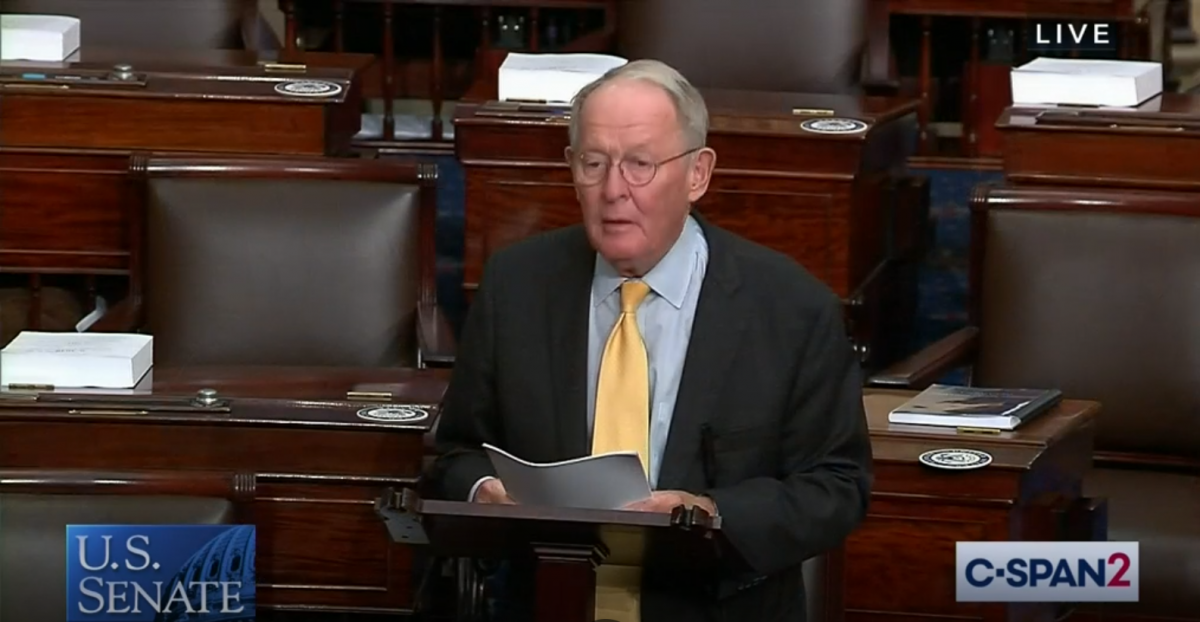
Nearing the end of his tenure in Congress, Senator Lamar Alexander, the chairman of the Senate education committee, proposed excusing those with no income from making student loan payments, as well as enacting one of his longtime goals: simplifying the forms used to apply for federal student aid.
Alexander, a Republican from Tennessee who is retiring at the end of the year, noted Tuesday in a speech on the Senate floor that the reprieve the CARES Act gave student loan borrowers from making payments during the coronavirus pandemic will run out on Sept. 30.
Under his proposal, Alexander said those without incomes, excluding unemployment, will not have to make federal student loan payments. Those who are continuing to make money would have to pay no more than 10 percent of their remaining income after paying for essentials like rent and food.
Under either scenario, loans will be forgiven after 20 years for undergraduate loans or 25 years for graduate student loans.
Alexander proposed replacing the various options for repaying loans with another approach -- making monthly payments on principal and interest over 10 years, which he said would lead to paying less in interest.
“The current bewildering system of nine different ways of paying off your student loans could be thrown in the trash heap,” he said.
Citing a Congressional Budget Office estimate, he also said simplifying the loan repayment process could save the government $10 billion over the next decade because students would be more likely to repay their loans.
Stimulus Bill Debate
Alexander made the proposal, which will be considered separately from a possible additional coronavirus relief package, on a day consumed by negotiations over the aid bill.
Though negotiations over the next package, expected to cost at least $1 trillion, are in its early stages, Senate Republicans are considering giving colleges and universities another $30 billion in aid, the chairman of the Senate’s education appropriations committee said.
Senator Roy Blunt told reporters that Republicans are planning to propose giving $70 billion in aid to K-12 schools, with half of it dedicated to schools that reopen, and another $5 billion for governors to use on education at their discretion.
In a key point for colleges, Blunt said the higher education funds would not be tied to their reopening.
“Managing the half for elementary and secondary is frankly enough to do. My view is that the money just needs to go to colleges and universities directly as it did last time,” said the Republican senator from Missouri, referring to the way aid for colleges in the CARES Act was distributed. He declined to say whether the Trump administration would go along.
The $30 billion in aid, however, would be less than the $46.6 billion associations representing colleges and universities have been seeking to soften the financial blow institutions have taken during the pandemic. And even that figure was conservative, according to higher education lobbyists. The American Council on Education, a group of presidents representing colleges and universities, had estimated the price tag for institutions to safely reopen campuses would be $74 billion.
Still, Senate Republicans were negotiating with the Trump administration over a number of sticking points, including how much to spend on increasing testing for the virus. Senate Majority Leader Mitch McConnell, a Kentucky Republican, told reporters a formal proposal would be released in the next few days. But he acknowledged any package would need some Democratic votes to pass the Senate.
“There’s always room for negotiations, because the Democrats are not irrelevant,” he said.
And Democrats are expected to try to increase money for education in the package. Senator Patty Murray, the top Democrat on the education committee, and Senator Chuck Schumer, the Senate Democratic leader, have proposed giving colleges $132 billion in additional aid to cover both the cost of reopening and to help with the financial hardship many institutions face.
The Democratic majority in the House, meanwhile, proposed giving $27 billion to states to spend on higher education, as well as another $10 billion that would go directly to public and nonprofit institutions.
“The situation is very fluid because Senator McConnell is trying to craft a consensus between the White House and Senate Republicans and there are a number of major sticking points in the discussion,” said Terry Hartle, ACE’s senior vice president for government and public affairs.
Meanwhile, Alexander proposed continuing to streamline the Free Application for Federal Student Aid, from 108 questions to between 20 and 33 questions. In a first step last year, Congress allowed the Internal Revenue Service to use the answers to 22 of the questions applicants had already given on their tax returns.
“Simplifying the FAFSA in this way would remove obstacles that will make it easier for more low-income Americans to attend colleges and would increase the number of Pell Grants each year,” he said.
It wasn’t immediately clear how Senate Democrats and advocates proposing other student debt forgiveness plans would receive Alexander’s proposals. In a New York Times opinion piece on Tuesday, Senator Elizabeth Warren reiterated a proposal by Senate Democrats to excuse monthly payments for the remainder of the pandemic, with a guarantee of eliminating at least $10,000 from each student borrower’s debt.
“We should broadly cancel student loan debt so families don’t have a student debt bomb waiting for them on the other side of this pandemic -- a burden that again falls disproportionately on students of color,” the Democratic senator from Massachusetts wrote.
"and" - Google News
July 22, 2020 at 02:03PM
https://ift.tt/2ZTHUGl
Alexander proposes student loan relief and FAFSA simplification - Inside Higher Ed
"and" - Google News
https://ift.tt/35sHtDV
https://ift.tt/2ycZSIP
And
Bagikan Berita Ini














0 Response to "Alexander proposes student loan relief and FAFSA simplification - Inside Higher Ed"
Post a Comment